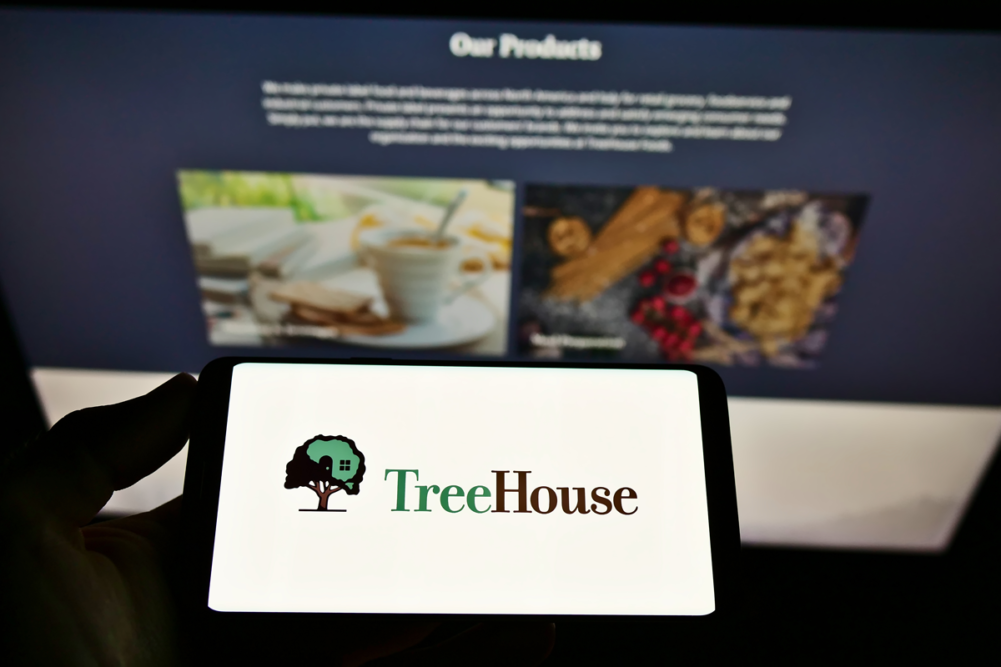OAK BROOK, ILL. – “Private label tailwinds are strong,” said William J. Kelley, chief financial officer for TreeHouse Foods, Inc. Unfortunately, supply chain limitations are preventing the private label manufacturers from taking full advantage of the opportunity.
A key challenge for the company is customer service levels, which are stuck at around 90%.
“Our target is higher than that, 98.5%,” Mr. Kelley said during a May 9 conference call with securities analysts to discuss first-quarter results. “So, we think we could have serviced much more demand had we hit our levels from that perspective.”
Servicing customers has been an ongoing issue for TreeHouse Foods. This past February, the company said nearly half of its 29 product categories were on allocation.
The market tailwinds Mr. Kelley referenced include consumer savings rates that have fallen below pre-pandemic levels as federal stimulus funds have ended and higher prices throughout the economy. Price gaps between branded and private label products, which historically have ranged between 26% to 30%, have widened into the low 30s, according to TreeHouse Foods.
“Today, given the absolute price point inflation, the dollar value savings of a basket of private label goods is simply more substantial,” said Steven T. Oakland, president and chief executive officer. “As a result, consumer shopping patterns are beginning to shift, and we’re seeing it in the data.”
The supply chain and customer service limitations flowed through to TreeHouse Foods’ bottom line. For the first quarter ended March 31, the company recorded a loss of $3 million. During the same period of the previous year the company earned $1.5 million, equal to 1¢ per share on the common stock.
Quarterly sales rose 7.9% to $1.14 billion.
“We have work to do to return the business to historic levels of profitability, but I’m encouraged with our progress and the start to the year,” Mr. Oakland said.
Benefiting the company in future quarters include price increases that went into effect in March and additional pricing that will take affect in the third quarter. Price increases contributed 11.7% to first-quarter results while volume and mix declined 3.7%.
TreeHouse Foods’ Meal Preparation business unit had sales of $728.1 million during the quarter, up from $678.5 the year before. The sales increase was driven by favorable pricing, according to the company, that was offset by lower volume due to labor and supply chain constraints.
Snacking and Beverage business unit sales were $412.9 million, up from $378.8 million in 2021.
“Our service has been strong in categories like pretzels and broth,” Mr. Kelley said. “And in a number of categories, we've been able to capture incremental private label demand coming our way. While Snacking and Beverages does have several categories that are still constrained, such as cookies and crackers, we are working diligently to improve production and restore service to target levels.”
Management reaffirmed fiscal 2022 guidance of net sales growth of at least 11% year-over-year and adjusted EBITDA of $385 million to $415 million, up approximately 5% year-over-year at the midpoint.
“Specific to the second quarter, we are anticipating flattish to slight sequential improvement in adjusted EBITDA margin,” Mr. Kelley said. “We continue to believe adjusted EBITDA margins will improve as the year continues and approach pre-pandemic levels in the second half, which, on average, were in the 11% to 12% range.”
In March, TreeHouse Foods announced it was exploring options for the divestment of the Meal Preparation business unit. In an update, Mr. Oakland said plans for the business unit are ongoing and that the board of directors is debating if the divestment should be one large transaction or several smaller ones.





